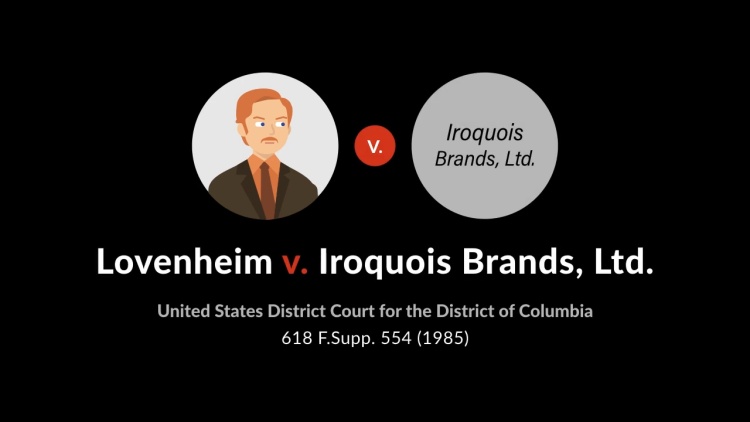Lovenheim v. Iroquois Brands, Ltd.
United States District Court for the District of Columbia
618 F. Supp. 554 (1985)

- Written by Sean Carroll, JD
Facts
Peter Lovenheim (plaintiff) was a shareholder in Iroquois Brands, Ltd. (Iroquois) (defendant). Iroquois was preparing to send proxy materials to its shareholders containing information about a shareholders meeting. Lovenheim sought to include in the proxy materials a proposed resolution that he planned to offer at the meeting. The resolution pertained to the allegedly inhumane procedures used to force-feed geese for production of pate de foie gras in France, which was a type of pate imported by Iroquois. Iroquois refused to include information on Lovenheim’s resolution in the proxy materials. Iroquois defended its refusal based on the SEC rule that a corporation may omit a proposal from its proxy statement “if the proposal relates to operations which account for less than 5 percent of [Iroquois’s] total assets at the end of its most recent fiscal year . . . and is not otherwise significantly related to [Iroquois’s] business.” Pate accounted for well less than 5 percent of Iroquois’s business. However, Lovenheim maintained that his proposal could not be excluded because of the second part of the rule in that it cannot be said that the proposal is not otherwise significantly related to Iroquois’s business. Lovenheim argued that the proposal had ethical or social significance.
Rule of Law
Issue
Holding and Reasoning (Gasch, J.)
What to do next…
Here's why 907,000 law students have relied on our case briefs:
- Written by law professors and practitioners, not other law students. 47,100 briefs, keyed to 996 casebooks. Top-notch customer support.
- The right amount of information, includes the facts, issues, rule of law, holding and reasoning, and any concurrences and dissents.
- Access in your classes, works on your mobile and tablet. Massive library of related video lessons and high quality multiple-choice questions.
- Easy to use, uniform format for every case brief. Written in plain English, not in legalese. Our briefs summarize and simplify; they don’t just repeat the court’s language.





